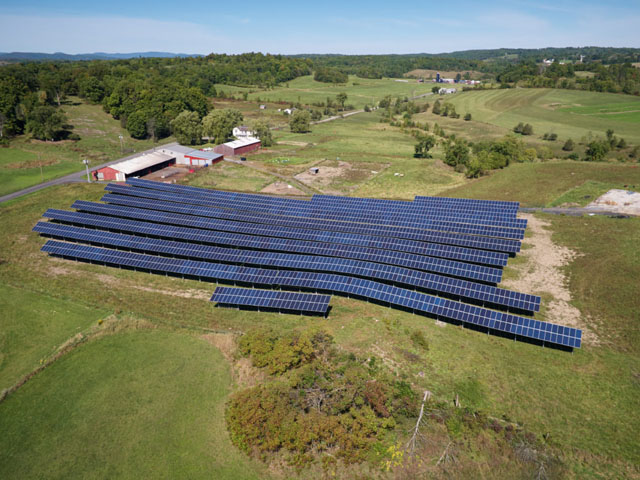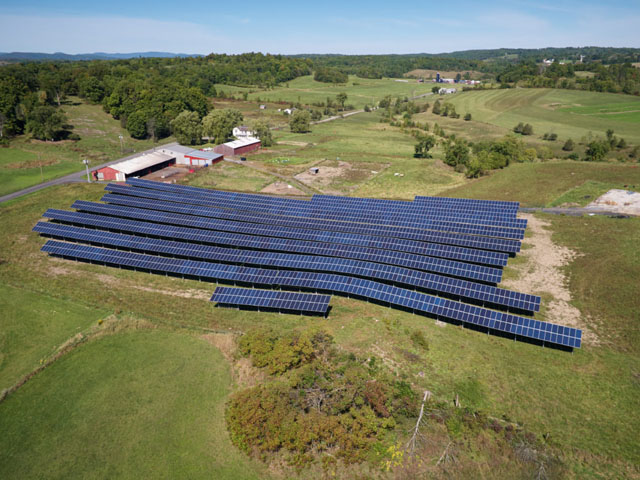Ag Policy Blog
Senate Passes Inflation Reduction Act, Including Climate-Smart Ag Funding
OMAHA (DTN) -- Farmers will be offered more incentives to plant cover crops or adopt other conservation practices after Democrats in the Senate pushed through the Inflation Reduction Act on Sunday, a bill considered key to President Joe Biden's agenda on climate change and health care.
After an overnight debate on amendments stretching into mid-afternoon Sunday, Vice President Kamala Harris broke a 50-50 tie to pass the bill. The $739 billion bill focuses on spurring renewable energy and reducing greenhouse-gas emissions, but also allows Medicare to negotiate drug rates and it increases eligibility for the Affordable Care Act. To fund these measures, Democrats set a $15% minimum tax on large corporations and new tax on stock buybacks.
The biggest chunk of spending -- about $369 billion -- would go toward addressing climate change in different ways, including programs for climate-smart agriculture and rural renewable energy. That includes about $20 billion for USDA conservation programs for farmers and landowners.
Democrats in the Senate advanced the bill in a vote early Saturday evening using a budget reconciliation rule that allows the bill to pass on a simple majority with the vice president voting to break the tie. The process is allowed on bills involving revenue and spending. Saturday evening's vote kicked off 20 hours of debate and votes on amendments that lasted all night.
The bill moves to the House, where House Speaker Nancy Pelosi, D-Calif., said Sunday the House "will return and move swiftly to send this bill to the President's desk."
The climate provisions in the bill are meant to help lower U.S. greenhouse emissions by 40% below 2005 levels by 2030. President Biden has set a goal to cut U.S. emissions by more than 50% by 2030.
Immediately after Sunday's vote, Sen. Debbie Stabenow, D-Mich., chairwoman of the Senate Agriculture Committee, pointed to support from more than 1,700 farm groups, companies, environmental advocates, economists, elected officials and trade groups.
"With the passage of this historic bill, Americans will see their energy costs go down while we tackle the urgent threats we face every day from the climate crisis," Stabenow said. "We are equipping farmers, foresters, and rural communities with the necessary tools to be a part of the solution. At the same time, we are investing in good-paying clean energy jobs to grow small towns and rural economies."
Republican senators tried every type of amendment and strategy to split Democrats over the weekend. They declared Democrats had succeeded in passing a "reckless" or "damaging tax and spend bill" that would do more to harm the economy and increase inflation rather than help it.
"New energy taxes and Green New Deal-style subsidies will worsen our current energy crisis and weaken our nation's economic and national security," said Sen. John Hoeven, R-N.D., ranking member on the Senate Agriculture Appropriations Subcommittee. "We need to unleash our domestic energy production and get our debt and deficit under control, while positioning our farmers and ranchers to continue to produce the highest quality lowest cost food supply in the world. We need to provide real, meaningful price relief to the American people but this bill that the Democrats pushed through using the budget reconciliation process doesn't do that, instead it increases taxes and spending."
CLIMATE SMART AG
The bill carves out $20 billion to support climate-smart agricultural practices for farmers. The funds would go to encourage farmers to adopt practices that reduce greenhouse emissions, reduce nitrogen loss or sequester carbon in the soil. The funds could also help with drought resilience in western states as well.
The National Milk Producers Federation immediately praised the climate-smart funding in the bill. The programs will help dairy farmers achieve an industry goal of net zero emissions by 2050.
"Dairy farmers seize environmental sustainability opportunities whenever possible," said Jim Mulhern, president and CEO of NMPF. "The funding increases in this package will better position dairy farmers to effectively implement the dairy sector's Net Zero Initiative and fulfill its 2050 environmental stewardship goals."
Among the provisions, the bill would pay farmers $25 an acre, up to 1,000 acres, to establish cover crops through the 2026 crop year, and include 2022 cover crops as well. The bill also includes a $5 per acre incentive for landowners to establish cover crops with renters as well. Another provision would provide payments to farmers hit with preventive planting to plant cover crops.
The funds would jump start USDA's current Climate Smart Commodities pilot program.
P[L1] D[0x0] M[300x250] OOP[F] ADUNIT[] T[]
The funding breakdown includes:
$8.45 billion for the Environmental Quality Incentives Program (EQIP)
$6.75 billion for the Regional Conservation Partnership Program (RCPP)
$3.25 billion for the Conservation Stewardship Program (CSP)
$1.4 billion for the Agricultural Conservation Easement Program (ACEP)
Another $1 billion would go to boost USDA conservation technical assistance as well.
USDA's Natural Resources Conservation Service would receive $300 million to quantify carbon sequestration and emissions on farmland.
The bill also includes $4 billion in provisions to help western states deal with drought challenges, including $550 million for water projects and $500 million for the Colorado River basin.
RENEWABLE ENERGY PROGRAMS
The bill includes $9.7 billion in grants and loans to rural electric cooperatives to buy renewable energy, renewable energy systems, carbon capture and storage systems, and make energy efficiency improvements on generation and transmission systems. Those provisions have the support of the National Rural Electric Cooperative Association (NRECA).
The Rural Energy for America Program would get a $1.72 billion to promote energy efficiency and renewable energy for farmers and other rural small businesses.
Another $1 billion would go for "Section 317" loans for electric generation from renewable energy resources for rural and nonrural power companies. This includes solar, wind, hydropower, biomass, or geothermal. The federal government would cover up to 50% of the loans for such projects.
Biofuels would see another $500 million to develop blender pumps and other infrastructure to increase the blends of biofuels above 10% blend levels for ethanol and 20% for biodiesel blends.
The bill also extends the $1 per gallon biodiesel tax credit to 2024 and retroactively restarting it at the beginning of 2022.
Several farm and renewable energy groups signed on to a letter backing the biofuel provisions, including the American Soybean Association, National Corn Growers Association, National Farmers Union, National Sorghum Producers, Growth Energy, the Renewable Fuels Association, the Advanced Biofuels Business Council, Clean Fuels Alliance America and Fuels America.
Programs to develop sustainable aviation fuels would receive $591 million as well. The bill includes up to $1.75 a gallon tax credit for sustainable aviation fuels through the end of 2024.
Other tax incentives would expand wind, solar and other renewable energy through 10 years of tax credits.
Over $10 billion in loans and grants would become available through the Department of Energy to spur the manufacturing and technology for vehicles with low- or zero-exhaust emissions, as well has electric and hybrid vehicles.
Another $10 billion in tax credits would go to incentivize manufacturing facilities for electric vehicles, wind turbines or solar panels.
CARBON SEQUESTRATION
The 45Q tax credit for industrial carbon sequestration would be extended to projects that begin construction before 2033. The tax credit for injection or utilization is increased to $60 a ton. Direct air capture would go to $180 a ton, and disposal of carbon would go to $85 a ton.
The tax credits would likely spur more focus on carbon pipelines and sinking carbon into the ground where possible. The tax credits increase the incentives for large chemical and cement plans to look at ways to capture emission.
LOAN AID FOR DISTRESSED FARMERS
Another addition to the bill would fix a provision from the American Rescue Plan that led White farmers to sue USDA last year.
The bill includes just over $1 billion to FSA to replace the loan reimbursement for socially disadvantaged farmers passed in 2021.
The new provisions help borrowers "who are at risk" -- as determined by USDA -- to pay 100% of their loans, up to $150,000. The loan repayment would be offset by any funds those farmers received under the Coronavirus Food Assistance Program (CFAP) and reducing any payments under the Market Facilitation Program (MFP). "Economically distressed borrowers" are considered at least 90 days delinquent as of April 30, 2021, or 90 days delinquent as of the end of 2020. A farmer could also qualify if they farm in an area with at least a 20% poverty rate, or in land held in trust by a Tribe or Native America.
Other farmers that would qualify for debt reduction include farmers in bankruptcy as of July 31, 2021, or receive a disaster set aside after Jan. 1, 2020, or has debt restructured after Jan. 1, 2020.
The bill also includes $750 million to provide farmers who experienced discrimination from USDA before Jan. 1, 2021. The bill would pay up to $500,000 to farmers who have proven to be discriminated against in USDA loan programs.
Chris Clayton can be reached at Chris.Clayton@dtn.com
Follow him on Twitter @ChrisClaytonDTN
(c) Copyright 2022 DTN, LLC. All rights reserved.






Comments
To comment, please Log In or Join our Community .